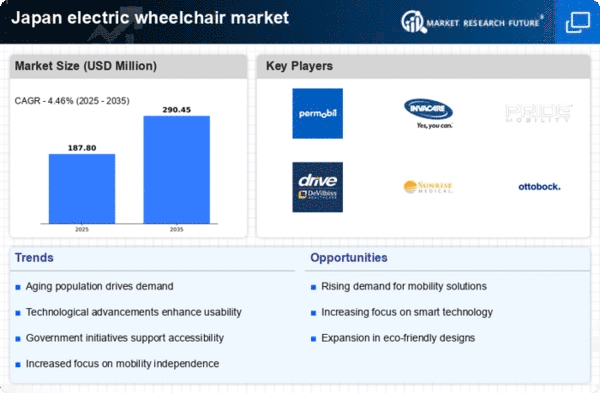Innovative Product Features
The electric wheelchair market in Japan is significantly influenced by the introduction of innovative product features that enhance user experience and functionality. Manufacturers are increasingly integrating advanced technologies such as smart controls, GPS navigation, and improved battery life into their electric wheelchairs. For instance, the incorporation of IoT technology allows for real-time monitoring of wheelchair performance, which can lead to better maintenance and user satisfaction. This trend is reflected in the market, where products with enhanced features are gaining traction, accounting for an estimated 35% of total sales in the electric wheelchair market. Such innovations not only attract consumers but also drive competition among manufacturers to deliver superior products.
Increased Healthcare Expenditure
Japan's healthcare expenditure has been on the rise, which positively impacts the electric wheelchair market. With the government investing heavily in healthcare services, there is a growing emphasis on providing assistive devices to improve the quality of life for individuals with mobility challenges. Reports suggest that healthcare spending in Japan is projected to reach ¥50 trillion by 2025, indicating a robust market for medical devices, including electric wheelchairs. This increase in funding allows for better access to electric wheelchairs, making them more affordable for consumers. Consequently, the electric wheelchair market stands to gain from this trend, as more individuals are likely to seek out these essential mobility aids.
Rising Demand for Mobility Solutions
The electric wheelchair market in Japan experiences a notable increase in demand for mobility solutions, driven by the growing awareness of accessibility needs among the elderly and disabled populations. As the population ages, the necessity for assistive devices becomes more pronounced. Recent data indicates that approximately 28% of the Japanese population is aged 65 and older, highlighting a significant market opportunity. This demographic shift compels manufacturers to innovate and enhance their product offerings, ensuring they meet the specific requirements of users. The electric wheelchair market is thus positioned to benefit from this rising demand, as consumers seek reliable and efficient mobility aids that improve their quality of life.
Growing Awareness of Disability Rights
The electric wheelchair market in Japan is positively impacted by the growing awareness of disability rights and the importance of inclusivity. Advocacy groups and non-profit organizations are actively promoting the rights of individuals with disabilities, leading to increased public support for accessible infrastructure and mobility solutions. This heightened awareness encourages consumers to seek electric wheelchairs as a means of enhancing their independence and mobility. The electric wheelchair market is thus likely to benefit from this cultural shift, as more individuals recognize the importance of having access to reliable mobility aids that empower them to participate fully in society.
Focus on Sustainable Mobility Solutions
The electric wheelchair market in Japan is witnessing a shift towards sustainable mobility solutions, driven by environmental concerns and government initiatives aimed at reducing carbon emissions. Manufacturers are increasingly adopting eco-friendly materials and energy-efficient technologies in their electric wheelchairs. This trend aligns with Japan's commitment to sustainability, as the government encourages the development of green technologies. As a result, the electric wheelchair market is likely to see a rise in demand for products that not only provide mobility but also contribute to environmental conservation. This focus on sustainability may appeal to a broader consumer base, including environmentally conscious individuals.
















